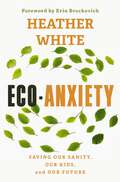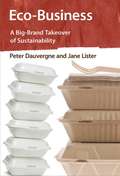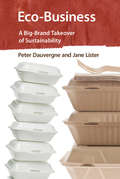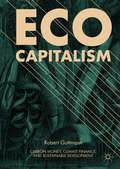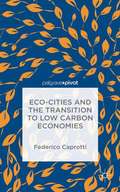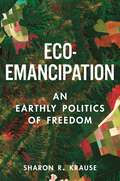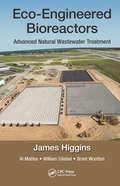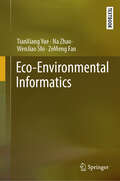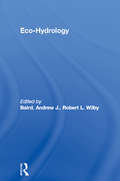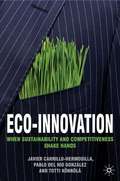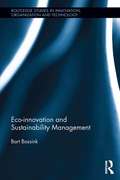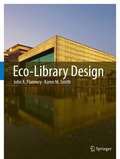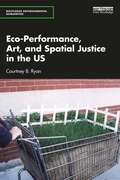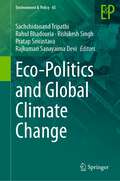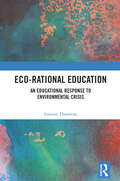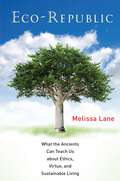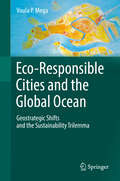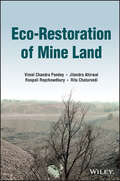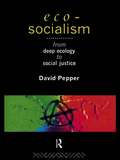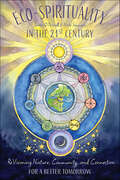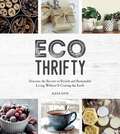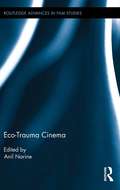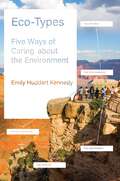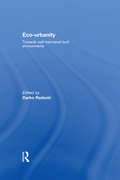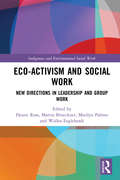- Table View
- List View
Eco-Anxiety: Saving Our Sanity, Our Kids, and Our Future
by Heather WhiteThe climate crisis and its resulting eco-anxiety is the biggest challenge of our time. The anxiety that comes with worrying about how environmental harm will impact our--and our children's--lives can be overwhelming. Learn how to balance practicing daily sustainability actions while caring for your own eco-anxiety in this revolutionary book from noted environmentalist Heather White.In Eco-Anxiety, White shows you how to contribute to the climate movement through self-discovery and self-care. Utilizing the Service Superpower Profile Assessment included in the text, you&’ll discover how your personality, interests, and strengths can be of service to others and the planet. This book will serve as your guide to:Begin a 21-Day Kickstarter Plan that shares specific sustainable actions you can takeTrack your progress with journal prompts and exercises that'll help you measure mental health benefitsListen and talk with loved ones about their climate anxietyCommit to being an eco-aware individual and inspire your family, friends, and community to work toward a regenerative, sustainable worldSetting the intention each day to take a small step to care for the planet--can help ease your eco-anxiety, push the culture toward climate solutions, and create a sense of joy.One Green Thing>
Eco-Business
by Peter Dauvergne Jane ListerMcDonald's promises to use only beef, coffee, fish, chicken, and cooking oil obtained from sustainable sources. Coca-Cola promises to achieve water neutrality. Unilever has set a deadline of 2020 to reach 100 percent sustainable agricultural sourcing. Walmart has pledged to become carbon neutral. Today, big-brand companies seem to be making commitments that go beyond the usual "greenwashing" efforts undertaken largely for public relations purposes. In Eco-Business, Peter Dauvergne and Jane Lister examine this new corporate embrace of sustainability, its actual accomplishments, and the consequences for the environment. For many leading-brand companies, these corporate sustainability efforts go deep, reorienting central operations and extending through global supply chains. Yet, as Dauvergne and Lister point out, these companies are doing this not for the good of the planet but for their own profits and market share in a volatile, globalized economy. They are using sustainability as a business tool. Advocacy groups and governments are partnering with these companies, eager to reap the governance potential of eco-business efforts. But Dauvergne and Lister show that the acclaimed eco-efficiencies achieved by big-brand companies limit the potential for finding deeper solutions to pressing environmental problems and reinforce runaway consumption. Eco-business promotes the sustainability of big business, not the sustainability of life on Earth.
Eco-Business: A Big-Brand Takeover of Sustainability (The\mit Press Ser.)
by Peter Dauvergne Jane ListerTwo experts explain the consequences for the planet when corporations use sustainability as a business tool.McDonald's promises to use only beef, coffee, fish, chicken, and cooking oil obtained from sustainable sources. Coca-Cola promises to achieve water neutrality. Unilever seeks to achieve 100 percent sustainable agricultural sourcing by 2020. Walmart has pledged to become carbon neutral. Big-brand companies seem to be making commitments that go beyond the usual “greenwashing” efforts undertaken largely for public-relations purposes. In Eco-Business, Peter Dauvergne and Jane Lister examine this new corporate embrace of sustainability, its actual accomplishments, and the consequences for the environment. For many leading-brand companies, these corporate sustainability efforts go deep, reorienting central operations and extending through global supply chains. Yet, as Dauvergne and Lister point out, these companies are doing this not for the good of the planet but for their own profits and market share in a volatile, globalized economy. They are using sustainability as a business tool. Dauvergne and Lister show that the eco-efficiencies achieved by big-brand companies limit the potential for finding deeper solutions to pressing environmental problems and reinforce runaway consumption. Eco-business promotes the sustainability of big business, not the sustainability of life on Earth.
Eco-Capitalism: Carbon Money, Climate Finance, and Sustainable Development
by Robert GuttmannOur planet faces a systemic threat from climate change, which the world community of nations is ill-prepared to address, and this book argues that a new form of ecologically conscious capitalism is needed in order to tackle this serious and rising threat. While the Paris Climate Agreement of 2015 has finally implemented a global climate policy regime, its modest means belie its ambitious goals. Our institutional financial organizations are not equipped to deal with the problems that any credible commitment to a low-carbon economy will have to confront. We will have to go beyond cap-and-trade schemes and limited carbon taxes to cut greenhouse gas emissions substantially in due time. This book offers a way forward toward that goal, with a conceptual framework that brings environmental preservation back into our macro-economic growth and forecasting models. This framework obliges firms to consider other goals beyond shareholder value maximization, outlining the principal tenets of a climate-friendly finance and introducing a new type of money linked to climate mitigation and adaptation efforts.
Eco-Cities and the Transition to Low Carbon Economies
by Federico CaprottiEco-cities are increasingly being marketed as solutions to a range of pressing global concerns, such as environmental and climate change, hyper-urbanization, demographic shifts, energy security, and the Peak Oil scenario. In response to these issues, eco-cities are being conceptualized as 'experimental cities', new urban areas in which new technologies and ways of organizing urban and economic life can be trialled, and where transition pathways towards low-carbon economies can be tested. The author examines the two most advanced eco-city projects under construction at the time of writing - the Sino-Singapore Tianjin Eco-City in China, and Masdar City in Abu Dhabi, United Arab Emirates. These are the largest and most notable attempts at building new eco-cities to both face up to the 'crises' of the modern world and to use the city as an engine for transition to a low-carbon economy.
Eco-Emancipation: An Earthly Politics of Freedom
by Sharon R. KrauseThe case for an eco-emancipatory politics to release the Earth from human domination and free us all from lives that are both exploitative and exploitedHuman domination of nature shapes every aspect of our lives today, even as it remains virtually invisible to us. Because human beings are a part of nature, the human domination of nature circles back to confine and exploit people as well—and not only the poor and marginalized but also the privileged and affluent, even in the world’s most prosperous societies. Although modern democracy establishes constraints intended to protect people from domination as the arbitrary exercise of power, it offers few such protections for nonhuman parts of nature. The result is that, wherever we fall in human hierarchies, we inevitably find ourselves both complicit in and entrapped by a system that makes sustainable living all but impossible. It confines and exploits not only nature but people too, albeit in different ways. In Eco-Emancipation, Sharon Krause argues that we can find our way to a better, freer life by constraining the use of human power in relation to nature and promoting nature’s well-being alongside our own, thereby releasing the Earth from human domination and freeing us from a way of life that is both exploitative and exploited, complicit and entrapped. Eco-emancipation calls for new, more-than-human political communities that incorporate nonhuman parts of nature through institutions of representation and regimes of rights, combining these new institutional arrangements with political activism, a public ethos of respect for nature, and a culture of eco-responsibility.
Eco-Engineered Bioreactors: Advanced Natural Wastewater Treatment
by James Higgins Al Mattes William Stiebel Brent WoottonThis book provides a comprehensive understanding of a highly innovative method of natural wastewater treatment using advanced in-groundbioreactors called Eco-Engineered Bioreactors (EEBs), and traces their evolution from the earliest aerated gravel bed versions once known as Engineered Wetlands (EWs) and now known as BREW Bioreactors (BBRs) all the way to today’s wide slate of aerobic and anaerobic varieties. Treatment using EEBs involves passing wastewaters through excavated basins in which they contact fixed films of microbial consortia on permeable substrate media. Written from the perspective of ecological engineers designing EEBs, this guide covers updated information on the state-of-the-art for EEBs, covering their morphologies, testing methods, designs, operations, and microbiology.
Eco-Environmental Informatics
by TianXiang Yue Na Zhao WenJiao Shi ZeMeng FanThis book describes the basic contents of eco-environmental informatics (EEI) systematically. It consists of ten chapters: development history of the groundworks of knowledge, data and models for the EEI emergence since the early 1850s, the core principles of EEI including methods for high-accuracy surface modelling and the fundamental theorem for eco-environmental surface modelling, spatial interpolations, scale-transformations, data fusion, and model-data assimilation, as well as their applications connecting ecology, environmental science, and geographical science. It is used as a textbook for advanced undergraduate and graduate students in the field of EEI. It also serves as a reference book for researchers involved in geographical information science, ecological informatics, environmental informatics, computer-aided design, and planetary surface modelling.
Eco-Hydrology
by Andrew J. Baird Robert L. Wilby^iEco-Hydrology is the first book to offer an overview of the complex relationships between plants and water across a wide range of terrestrial and aquatic environments. Leading ecologists and hydrologists present reviews of the eco-hydrology of drylands, wetlands, temperate and tropical rain forests, streams, and rivers and lakes. Contents include:* background information on the water relations of plants, from individual cells to strands of plants* the role of mathematical models in eco-hydrology* explanations of how plants affect patterns and rates of water movement and storage in a range of terrestrial and aquatic ecosystems.
Eco-Innovation
by Javier Carrillo-HermosillaThis book considers the impact industry has on our environmental surroundings while exploring the need for more sustainable development. The concept of sustainable development and the general understanding of the interdependence of the environment and the economy are both examined in this thought-provoking new book.
Eco-Innovation and Sustainability Management (Routledge Studies in Innovation, Organizations and Technology)
by Bart BossinkSustainability is a phenomenon that must be pursued in a complex system of interrelated elements of business, society, and ecology. It is important to gain an understanding of these elements, the interplay between them, and the behavior of the system. This book explores the business-societal-and-ecological system in which sustainable innovation has to be envisioned, conceptualized, realized, and improved. Author Bart Bossink offers insight into the systematic coherence of drivers of eco-innovation and sustainability utilizing a three-part approach: (1) eco- and sustainable innovation in business is based on ideas and people who cooperatively develop these ideas; (2) groups of people, organized in commercial firms, must realize these ideas cooperatively and create the innovations that can conquer the market; and (3) that people from governmental, non-governmental, not-for-profit, research, and commercial organizations can build institutional arrangements that stimulate these sustainable innovations, changing both industry and society. Adopting a managerial perspective and discussing concepts and methods to manage eco-innovation in business, this book highlights the interrelated roles of the individual, the firm, partnerships, and business environments. Researchers and practitioners who want to combine a commercial and economical approach with an ethical and social ambition to create an ecologically sustainable firm stand to learn much from these pages.
Eco-Library Design
by John A. Flannery Karen M. SmithThe ancient pairing of architecture and books has always been an interesting topic for debate, and the increasing popularity of electronic books has recently added fuel to the fire. However, the bonfires built for the printed version remain unlit. Research undertaken for this publication suggests that the traditional reading room is currently enjoying a renaissance in many different guises, with print and digital media enjoying a symbiotic relationship. The digital revolution is just one of the many challenges faced by the library architect. To satisfy the varied requirements of library users, flexible, future proof, indoor and outdoor spaces must now support both passive and active pursuits. These often contrasting demands can vary dramatically from quiet, contemplative reading to audible public performance. This publication explores in detail the evolution of the eco-library, focusing on how design teams cope with diminishing resources in diverse geographic and climatic conditions. The featured projects demonstrate measurable reductions in both construction and operating costs through innovative designs that utilise the ecology of a selected site in a positive way. A library development will now inevitably seek to lead by example, visibly demonstrating sound environmental practice, and providing an enhanced user experience for increasingly more discerning patrons. Eco-Library Design provides a worldwide perspective on 21st century trends in library architecture.
Eco-Performance, Art, and Spatial Justice in the US (Routledge Environmental Humanities)
by Courtney B. RyanIn Eco-Performance, Art, and Spatial Justice in the US, Courtney B. Ryan traces how urban artists in the US from the 1970s until today contend with environmental domestication and spatial injustice through performance. In theater, art, film, and digital media, the artists featured in this book perform everyday, spatialized micro-acts to contest the mutual containment of urbanites and nonhuman nature. Whether it is plant artist Vaughn Bell going for a city stroll in her personal biosphere, photographer Naima Green photographing Black urbanites in lush New York City parks, guerrilla gardeners launching seed bombs into abandoned city lots, or a satirical tweeter parodying BP’s response to the 2010 Deepwater Horizon oil spill, the subjects in this book challenge deeply engrained Western directives to domesticate nonhuman nature. In examining how urban eco-artists perform alternate ecologies that celebrate the interconnectedness of marginalized human, vegetal, and aquatic life, Ryan suggests that small environmental performances can expose spatial injustice and increase spatial mobility. Bringing a performance perspective to the environmental humanities, this interdisciplinary text offers readers stymied by the global climate crisis a way forward. It will appeal to a wide range of students and academics in performance, media studies, urban geography, and environmental studies.
Eco-Politics and Global Climate Change (Environment & Policy #65)
by Rishikesh Singh Rahul Bhadouria Sachchidanand Tripathi Pratap Srivastava Rajkumari Sanayaima DeviThis book provides an in-depth insight into the ecological perspective on a number of ongoing issues pertaining to security, the economy, the state, global environmental governance, development, and the environment. The chapters critically compare and analyze the role of global eco-politics in understanding and sorting out issues linked with climate change. Furthermore, it presents a contemporary and accessible description of why we need to embrace eco-politics in order to address the various ecological challenges that we face in the current changing climate scenario.
Eco-Rational Education: An Educational Response to Environmental Crisis
by Simone ThorntonEco-Rational Education proposes an educational response to climate change, environmental degradation, and human relations to ecology through the delivery of critical land-responsive environmental education. The book argues that education is a powerful vehicle for both social change and cultural reproduction. It proposes that the prioritisation and integration of environmental education across the curriculum is essential to the development of ecologically rational citizens capable of responding to the environmental crisis and an increasingly changing world. Using philosophical analysis, particularly environmental philosophy, pragmatism, and ecofeminism, the book develops an understanding of contemporary issues in education, especially inquiry-based learning as pedagogy, diversifying knowledge, environmental and epistemic justice, climate change education, and citizenship education. Eco-Rational Education will be of interest to researchers and post-graduate students of social and political philosophy, educational philosophy, as well as environmental, ethics and teacher education.
Eco-Republic: What the Ancients Can Teach Us about Ethics, Virtue, and Sustainable Living (Peter Lang Ltd Ser. #23)
by Melissa LaneAncient lessons for sustainable citizenshipAn ecologically sustainable society cannot be achieved without citizens who possess the virtues and values that will foster it, and who believe that individual actions can indeed make a difference. Eco-Republic draws on ancient Greek thought—and Plato's Republic in particular—to put forward a new vision of citizenship that can make such a society a reality. Melissa Lane develops a model of a society whose health and sustainability depend on all its citizens recognizing a shared standard of value and shaping their personal goals and habits accordingly. Bringing together the moral and political ideas of the ancients with the latest social and psychological theory, Lane illuminates the individual's vital role in social change, and articulates new ways of understanding what is harmful and what is valuable, what is a benefit and what is a cost, and what the relationship between public and private well-being ought to be.Eco-Republic reveals why we must rethink our political imagination if we are to meet the challenges of climate change and other urgent environmental concerns. Offering a unique reflection on the ethics and politics of sustainability, the book goes beyond standard approaches to virtue ethics in philosophy and current debates about happiness in economics and psychology. Eco-Republic explains why health is a better standard than happiness for capturing the important links between individual action and social good, and diagnoses the reasons why the ancient concept of virtue has been sorely neglected yet is more relevant today than ever.
Eco-Responsible Cities and the Global Ocean: Geostrategic Shifts And The Sustainability Trilema
by Voula P. MegaThis book examines the nexus of cities and oceans and the interrelations between the Sustainable Development Goals (SDGs) 11 and 14, just after the first two critical years following the milestone year of hope in 2015. It advocates for actions both for sustainable cities, the largest interconnected and only human ecosystem, and for the global ocean that is the largest physical ecosystem. Cutting-edge concepts and actions are presented by and for cities and oceans, following the global engagements during the years 2015-2017. In the era of global geopolitics, cities offer major democratic spaces between the micro-regulations of the local communities and the governance of the global commons. The role of education, trust, and citizen empowerment cannot be stressed enough. This book offers an evidence-based, holistic and integrated view of key urban and ocean sustainability issues at the horizon of 2030 and of 2050. The chapters cover the most prominent issues at the heart of the matter, and highlight systemic multi-stakeholder eco-responses towards sustainability with economic, social, environmental dimensions, including political and cultural aspects. This book offers a full exploration of cities and seas with an emphasis on vigorous paradigm shifts, redesigning human systems, and reconciling them with nature. Building on robust evidence, and transformational cases, it provides structured advice for world leaders, stakeholders and scholars.
Eco-Restoration of Mine Land
by Vimal Chandra Pandey Jitendra Ahirwal Roopali Roychowdhury Ritu ChaturvediEco-Restoration of Mine Land An authoritative introduction to the ecosystem-based approach for restoring land after coal and mineral mining operations. Mining activities, in particular where metal ores have been mined, often leave behind vast areas of dumps and disused mine lands that have become environmental hazards. Soil degradation and poisoning are major environmental concerns in these areas, requiring comprehensive and long-term interventions in order to restore those lands to an ecologically productive state. Eco-Restoration of Mine Land provides a comprehensive overview of ecosystem-based solutions for remediating polluted soil and re-establishing vegetation in disused mine lands, synthesizing cutting-edge research, experiential knowledge, and longstanding best practices to offer a holistic introduction to the science of mine land restoration. Eco-Restoration of Mine Land readers will also find: A basic introduction to soil contamination, risk assessment, and phytoremediation of mine land Discussion of carbon sequestration potential of restored mine soils and other environmental benefits of remediated mine land The use of biological soil quality indicators to assess progress in ecosystem restoration Eco-Restoration of Mine Land is a valuable guide for researchers and advanced students in the environmental and ecological sciences, as well as professionals working in environmental remediation, providing a much-needed survey of this increasingly critical subject.
Eco-Socialism: From Deep Ecology to Social Justice
by David PepperFirst Published in 2004. Routledge is an imprint of Taylor & Francis, an informa company.
Eco-Spirituality in the 21st Century: ReVisioning Nature, Community, and Connection for a Better Tomorrow
by Dana O'Driscoll Nate SummersEco-Spirituality offers a new vision for nature spirituality both by drawing upon ancient, ancestral connections and by visioning human-nature-spirit connections for a brighter future. The authors combine their collective skill sets in druidry, wilderness survival skills, permaculture, and more, to create this new framework for engaging in an eco-centric spiritual practice and lifestyle in the 21st century. This in-depth guide explores seven principles for reenvisioning humans&’ relationship with the living earth: Reconnection, Respect, Rewilding, Regeneration, Resilience, Reenchantment, and Revisioning. Each principle is introduced through storytelling and then discovered through the Bard, Ovate, and Druid framework, detailing exercises the reader can engage in to experience the principle through creative, explorative, interpersonal, and spiritual actions. Readers will explore how to • build community around nature-based ceremony, cultural sharing, and experiences in the wild; • develop meaningful skill sets such as permaculture, survival, and ancestral skills; • tap into the primordial energy of the Earth and nature through ceremony and meditation; • use ceremony to rejuvenate and regenerate the natural world; • reconnect with nature in meaningful ways, including building ecological knowledge; • rewild their lives with wild movement and creativity, and connecting to nature&’s rhythms; and • tend and regenerate their local ecosystems and communities. With Eco-Spirituality, discover a guide to a more meaningful, connected, and future-oriented nature spirituality.
Eco-Thrifty: Discover the Secrets to Stylish and Sustainable Living Without it Costing the Earth, Including Upcycling, Recycling, Budget-Friendly Ideas and More
by Alexa KayeLiving well doesn’t have to cost the earthWe all want to do our bit for the planet, and now it’s easier than ever. This book is your guide to eco-thrifty living: the way to look out for the climate and your budget at the same time. Explore the art of recycling and upcycling to spruce up your home and garden, find out how to revamp old clothes and how to say no to waste, and learn the secrets to conscious, creative living – all without the hefty price tag.There is no planet B, but with eco-thrifty living, we won’t need one. From nifty cleaning tips, to stylish home decor and natural beauty, discover the countless ways to reduce your carbon footprint and live a life you love that’s sustainable – both for the world and your wallet.
Eco-Trauma Cinema (Routledge Advances in Film Studies)
by Anil NarineFilm has taken a powerful position alongside the global environmental movement, from didactic documentaries to the fantasy pleasures of commercial franchises. This book investigates in particular film’s complex role in representing ecological traumas. Eco-trauma cinema represents the harm we, as humans, inflict upon our natural surroundings, or the injuries we sustain from nature in its unforgiving iterations. The term encompasses both circumstances because these seemingly distinct instances of ecological harm are often related, and even symbiotic: the traumas we perpetuate in an ecosystem through pollution and unsustainable resource management inevitably return to harm us. Contributors to this volume engage with eco-trauma cinema in its three general forms: accounts of people who are traumatized by the natural world, narratives that represent people or social processes which traumatize the environment or its species, and stories that depict the aftermath of ecological catastrophe. The films they examine represent a central challenge of our age: to overcome our disavowal of environmental crises, to reflect on the unsavoury forces reshaping the planet's ecosystems, and to restructure the mechanisms responsible for the state of the earth.
Eco-Types: Five Ways of Caring about the Environment
by Emily Huddart KennedyWhy acknowledging diverse eco-social relationships can help us overcome the political polarization that undermines our ability to protect the environmentWhen we picture the ideal environmentalist, we likely have in mind someone who dedicates herself to reducing her own environmental footprint through individual choices about consumption—driving a fuel-efficient car, for example, or eating less meat, or refusing plastic straws. This is a benchmark that many aspire to—and many others reject. In Eco-Types, Emily Huddart Kennedy shows that there is more than one way to care about the environment, outlining a spectrum of eco-social relationships that range from engagement to indifference.Drawing on three years of interviews and research, Kennedy describes five archetypal relationships with the environment: the Eco-Engaged, often politically liberal, who have an acute level of concern about the environment, a moral commitment to protect it, and the conviction that an individual can make a difference; the Self-Effacing, who share the Eco-Engaged’s concerns but not the belief in their own efficacy; the Optimists, often politically conservative, who are confident in their relationship with the environment, doubt the severity of environmental problems, and resent insinuations that they don’t care; the Fatalists, who are pessimistic about environmental decline and feel little responsibility to adopt environment-friendly habits; and the Indifferent, who have no affinity for any part of the environmental movement.Kennedy argues that when liberals feel they have a moral monopoly on environmental issues, polarization results. If we are serious about protecting the planet, we must acknowledge that we don’t all need to care about the environment in the same way.
Eco-Urbanity: Towards Well-Mannered Built Environments
by Darko RadoviThere is need for change in our currently unsustainable cities. Carefully outlining paths towards better, sustainable ways of urban living, this book proposes a radical change in the ways we conceive and live our urban environments. Bringing together diverse cultural and disciplinary views on urban sustainability, eighteen leading academics and practitioners in sustainable architecture and urbanism explore global concerns of sustainability and urbanity. This broad range of issues are clearly articulated and linked to concrete places and projects, merging research and cutting-edge design investigations to promote environmentally and culturally sensitive urban futures.
Eco-activism and Social Work: New Directions in Leadership and Group Work (Indigenous and Environmental Social Work)
by Martin Brueckner Marilyn Palmer Dyann Ross Wallea EaglehawkSocial workers are called upon to shift from a human-centric bias to an ecological ethical sensibility by embracing love as integral to their justice mission and by extending the idea of social justice to include environmental and species justice. This book presents the love ethic model as a way to do eco-justice work using public campaigns, research, community arts practice and other nonviolent, direct action strategies. The model is premised on an active and ongoing commitment to the eco-values of love, eco-justice and nonviolence for the purpose of upholding the public interest. The love ethic model is informed by the stories of eco-activists who used nonviolent actions to address ecological issues such as: pollution; degradation of the environment; exploitation of farm animals; mining industry overriding First Nation Peoples’ land rights; and human health and social costs related to the natural resource industries, private land developments and government infrastructure projects. Informed by practice insights by activists from a range of eco-justice concerns, this innovative book provides new directions in social work and environmental studies involving transformational change leadership and dialogical group work between interest groups. It should be considered essential reading for social work students, researchers and practitioners as well as eco-activists more generally.
